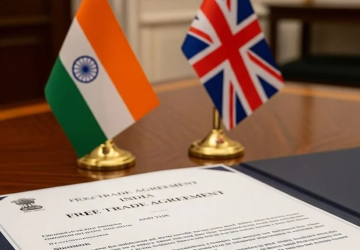
India’s export engine of most of the labour intensive sector is likely to face a sharp deceleration as the US administration confirmed the imposition of 50% tariff on a wide range of Indian goods, sparing only a handful of categories such as electronics and pharmaceuticals.
Apparel products are the worst hit, with knitted garments facing an overall tariff of 63.9% when combined with the Most Favoured Nation (MFN) duty. A report by the Global Trade Research Initiative (GTRI) estimates that 66% of India’s $86.5 billion exports to the US will now fall under the 50% tariff slab, translating into $60.2 billion worth of goods. Organic chemicals and carpets will attract 54% and 52.9% tariffs, respectively.
The impact was partially visible. After the August 6 announcement of imposition of additional 25% US tariff, Indian carpet exporters reported mass cancellations of US orders, forcing several units to curtail operations and lay off hundreds of artisans. The US is the single-largest market for India’s textile and apparel items.
Almost 28% of India’s textile and apparel exports go to the United States. India’s exports of textile and apparel products to the US in the financial year 2024-25 was close to $11 billion, cited Confederation of Indian Textile Industry (CITI), thereby underscoring the vulnerability.
The Federation of Indian Export Organisations (FIEO) said units in Tirupur, Noida and Surat have paused production, squeezed by spiralling costs. Carpet and apparel sectors remain more vulnerable due to lower cost rivals from Vietnam and Bangladesh.
FIEO president SC Ralhan warned that labour-intensive sectors like textiles, carpets, handicrafts, leather and ceramics risk a sharp erosion of competitiveness, especially against European, South-East Asian and Mexican rivals.
Exports of diamonds, gold and jewellery, valued at $10 billion annually, face duties jumping from 2.1% to 52.1%, threatening jobs in polishing hubs like Surat, Mumbai and Jaipur. US buyers may shift to suppliers in Israel, Belgium, China and Mexico.
“Shrimp exporters, who send more than half their output to the US, fear steep losses and order cancellations. This also impacts the prices for US consumers and makes India less competitive against rivals like Ecuador,” according to a report by SBI.
The auto components sector is expected to be only marginally affected, though MSME suppliers of gearbox and transmission equipment will be impacted. In the steel industry, the US tariffs are expected to have a negligible impact on MSMEs, as they are mainly engaged in producing long products, while the US primarily imports flat products from India.

















